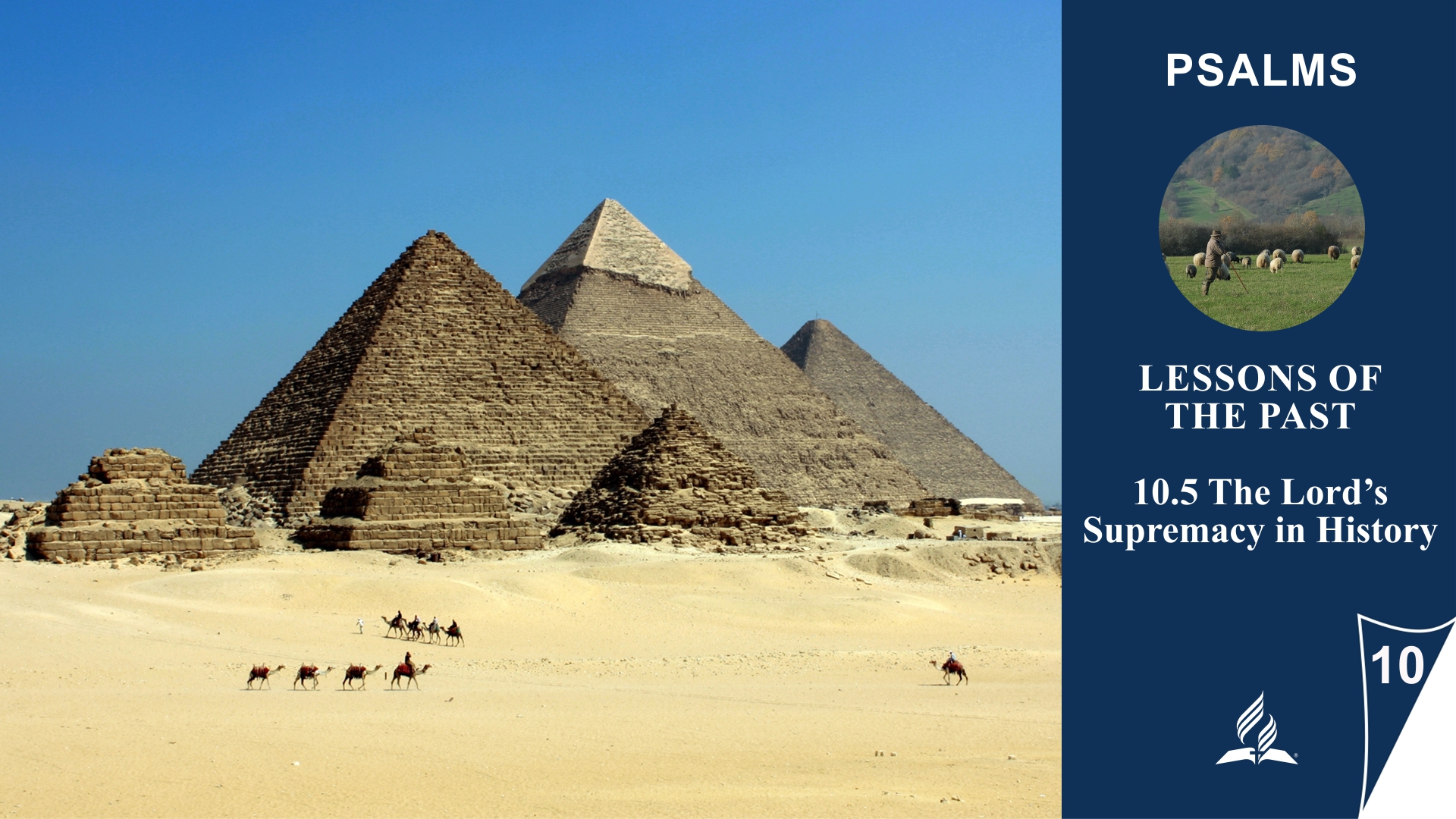Lesson 10.Lessons of the Past | 10.5 The Lord’s Supremacy in History



10.5 The Preeminence of God in History
The Unshakable Sovereignty of God: A Reflection on Psalm 135
Read Psalm 135. What historical events are highlighted in this psalm? What lessons does the psalmist draw from them?
Psalm 135 is a call to praise the Lord for His goodness and faithfulness, which have been revealed in various historical events. The psalmist highlights the following historical events:
-
The Creation: God is praised as the Creator of the world who made the heavens and the earth. This reminder of God’s sovereignty over creation reminds the people that God is the source of all power and authority.
-
The Exodus from Egypt: The psalm recalls God’s great deeds during the exodus from Egypt, including the plagues He brought upon Egypt to free His people. This event testifies to God’s power and mercy towards His people.
-
The Conquest of the Promised Land: God is thanked for His help in the conquest of the promised land. This illustrates God’s faithfulness to His people and His willingness to protect and support them.
From these historical events, the psalmist draws several lessons:
-
God’s Sovereignty and Power: The psalm emphasizes God’s unparalleled power and authority over creation and history. The people are encouraged to rely on God’s guidance and protection.
-
God’s Faithfulness and Mercy: Despite the faults and imperfections of the people, God repeatedly shows His faithfulness and mercy. This encourages the people to trust in God and remain faithful to Him.
-
The Futility of Idolatry: The psalm highlights the futility of idolatry and emphasizes that only God should be worshiped. Idolatry leads to hopelessness and powerlessness, while worshiping the true God offers security and strength.
In our daily lives and faith, we can learn from Psalm 135 to praise God for His faithfulness and power and to rely on Him as our source of security and hope. We should remember that God is unmatched in creation and history, and He alone deserves our worship. By relying on God and remaining faithful to Him, we can experience His help and protection even in the midst of difficulties and challenges.
How can we ensure that we have no idols in our lives? Why can idolatry be easier than we think?
We can ensure that we have no idols in our lives by taking some important steps:
-
Self-reflection and Examination: It is important to regularly pause and examine our lives to determine if there is anything that distracts our devotion and worship from God. This requires honest self-reflection and a willingness to identify potential idols in our lives.
-
Setting Priorities: We should ensure that God is first in our lives and our highest priority. This means dedicating time to prayer, reading the Bible, fellowship, and worship, and ensuring that our decisions and actions are guided by our faith.
-
Making Decisions: We should consciously make decisions that align with our faith and beliefs, and refrain from anything that could distract us from God. This may mean avoiding certain activities, relationships, or habits that could weaken our faith.
-
Community and Accountability: It is helpful to have a community of believers around us who can encourage and support us in living out our faith and hold us accountable when we stray from our path.
Why can idolatry be easier than we think?
-
Subtle Forms of Idolatry: Idolatry can be subtle and manifest in various forms that we may not immediately recognize. It can involve the worship of material possessions, personal success, relationships, or even our own ego.
-
Distractions and Temptations: In a world characterized by distractions, pleasures, and self-fulfillment, we can easily be tempted to shift our worship and devotion from God to other things. These distractions can lead us to lose sight of our priorities and drift away from God.
-
Our Human Nature: As humans, we are prone to sin and temptation, including idolatry. Our natural inclination towards selfishness and self-glorification can lead us to prioritize our own needs and desires over worshiping God.
-
Lack of Awareness: Often, we may not be aware of how subtle and insidious idolatry can be. We may become immersed in habits, relationships, or activities without realizing that they distract us from our devotion to God.
-
Lack of Spiritual Vigilance: If we are not spiritually vigilant and neglect our relationship with God, we can easily be distracted by other things and engage in idolatry without realizing it.
Overall, idolatry is a real danger that can often be subtle and insidious. Therefore, it requires constant vigilance, self-reflection, and a willingness to regularly reassess our priorities to ensure that God is first in our lives.

The connection of Psalm 135 with our everyday life and faith is multifaceted and offers important lessons and guidance:
-
Worship and Gratitude: The psalm reminds us to praise God for His goodness, faithfulness, and power. In our daily lives, we can develop a conscious attitude of worship through prayer, praise, and gratitude, remembering that God is sovereign in every situation.
-
Trust and Hope: The emphasis on God’s faithfulness and power in Psalm 135 encourages us to have trust in God and find hope in Him. Even amidst difficulties, we can trust that God is with us and cares for our well-being.
-
Turning Away from Idolatry: The psalm warns against idolatry and emphasizes the futility of idols. In daily life, we can turn away from all forms of idolatry, whether it be the worship of material things, selfishness, or other false priorities, and instead focus on worshiping the true God.
-
God’s Sovereignty over History: Psalm 135 reminds us that God reigns sovereign over history and His plans ultimately prevail. This can encourage us in daily life not to be overwhelmed by fear or worry about the future but to trust that God is in control.
-
Service and Obedience: In light of God’s faithfulness to His people, the psalm encourages us to serve Him faithfully and obediently. In everyday life, we can strive to follow God’s commandments and live out His example of love and mercy towards others.
Overall, Psalm 135 provides a connection between our everyday life and our faith by reminding us to worship God, trust Him, turn away from idolatry, acknowledge His sovereignty, and serve Him faithfully. These principles can help us lead a fulfilled and godly life founded on God’s rule and His love.
(Visited 25 times, 1 visits today)
Post Views: 529




















